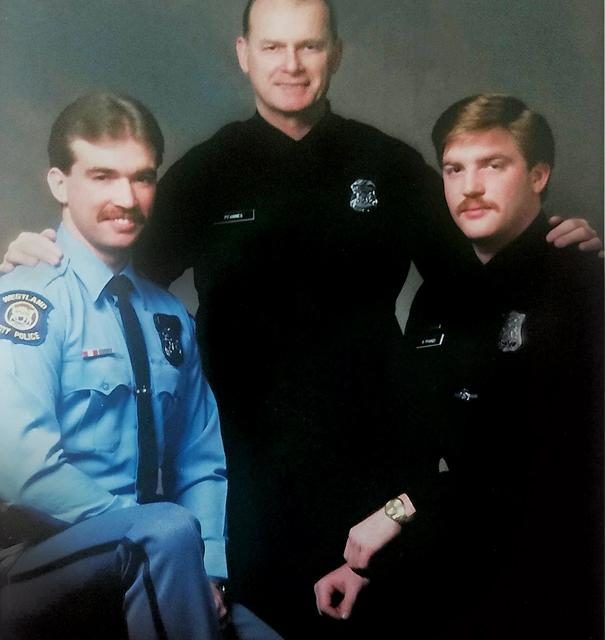“When I got the layoff notice from the Detroit Police Department, I was distraught,” says Bob Pfannes, Ann Arbor’s recently retired police chief, his voice tight with emotion.
“I started May 4, 1987,” Pfannes continues, sitting in the corner office he’d soon vacate in the Justice Center. “I loved working for the Detroit Police Department. I grew up in the city of Detroit. My dad was a Detroit police officer. My brother is a police officer. My cousin is a police officer. My brother-in-law is a police officer.”
A thirty-year-old photo behind his desk shows a frowning young Pfannes (“like phonics without the c,” he says) sitting next to his brother while their proudly smiling father stands behind them, a hand on each’s shoulder.
But Pfannes wasn’t destined for a career in the DPD. With the city on the glide path toward bankruptcy, his first layoff notice came in 1989. It was withdrawn when the union made pension concessions, but he got another the following year.
He didn’t wait for the layoff. “I went to Garden City,” says the youthful-looking fifty-seven-year-old strawberry blond. “It was a really good department, but Garden City is six square miles and a bedroom community. It felt incredibly small and unchallenging after Detroit. And everybody looked the same.” While Detroit is 79 percent black, Garden City is 93 percent white. He moved on to Ann Arbor in 1998.
“I had an old partner come out to Ann Arbor, and he kept telling me that I would really like it here,” Pfannes recalls. He did: “I liked how diverse the city was, the architecture, the people from all walks of life–from every racial, ethnic, economic, demographic [group]. I went on a ride-along, and the first call was a homeless guy, and the second call was a multimillionaire involved in an accident.”
He felt lucky to get the job. “Back then, if you went to apply for a job, 600 to 1,200 people showed up. Now everybody’s hiring, and you can’t find enough people. It’s a nationwide problem.” Citing a robust economy and negative perceptions of policing, the Washington Post reported in December that applications to police departments fell by two-thirds over the last decade.
“People don’t become police officers to get rich,” says Pfannes. “They’re looking for the nobility of the profession. They like to help people, and when the police got caricatured as bad people, it removed a lot of the nobility.”
Echoing county sheriff Jerry Clayton, he adds that people “don’t want to do shift work anymore. Especially the millennials and Gen Ys,” Pfannes smiles. “When you’re brand new, you’re going to be working at night, on holidays, on weekends.”
That’s how he did it. A sergeant in Garden City, he started over here as a patrol officer. He worked his way back up to sergeant, then to lieutenant, to deputy chief, and finally to chief when Jim Baird retired in March 2018.
Pfannes retired at the end of May as the city wrapped up its search for a permanent chief. City administrator Howard Lazarus has recommended Boston PD bureau chief Michael Cox for the job.
—
Over the three decades he’s been a cop, Pfannes says policing has changed tremendously. “When I first started in Detroit, you finished the police academy, and there was very little in-service training after that. We didn’t have pepper spray [or] Tasers. We were given a nightstick and a gun. Those were the tools that you had.
“We were greatly understaffed,” he adds of his years in Detroit. But the biggest difference is that “when I started, if there was a fatal use of force, the officer was given the benefit of the doubt that they acted in good faith.
“That didn’t mean that it didn’t get investigated, that they might not be criminally charged, that they might not lose their job,” he adds. “But it didn’t start out with the proposition that the officer had evil intent.
“The fatal use of force is very rare,” he points out. In the U.S., “the police have, over the last three years, killed an average of 980 people. That’s a substantial number.” But in each of those years, “we arrested, handcuffed, and took to jail approximately 11 million people.”
It’s an issue here because of the shooting death of Aura Rosser by an Ann Arbor officer in November 2014. Rosser was mentally ill, her boyfriend had called 911, and she was advancing on the responding officers with a knife when she was shot, so the county prosecutor and the state police determined the officer had fired in self defense. But “that got the ball rolling,” Pfannes says, on calls for a police oversight commission.
“There were some people who were very committed to their cause and felt that justice wasn’t done,” he says philosophically. “It’s a trend in progressive cities across the country.”
He doesn’t foresee the commission changing how the AAPD operates. “In the day-to-day existence of the officers, I don’t think it’s going to have a huge impact,” he says. “Officers already know that they’re going to be held accountable.
But, he says, “they want a fair assessment of what they’ve done. They don’t want everything viewed through either a political lens or [by] somebody who does not understand what they do or what their training is.”
Some say the police oversight commission will make the city safer because cops know civilians will review their actions. Others argue it will be less safe because cops will be second-guessing themselves. Pfannes believes “neither one of those is true. Officers already know that any use of force is reviewed on multiple levels.” Adding one more is just “another layer to increase our credibility with people who are distrusting of us.
“I told the commission the very first day that we have the best police department in the state of Michigan. Let the light shine in. The more they got to know what we do, why we do it, the more they got to know the officers, saw the resources we had, that the more impressed they would be. Whoever the new chief is, they’re in a very strong position–one I inherited too.”
—
If he could change anything about the AAPD, Pfannes “would certainly like more staffing. When I was hired, we were up to around 200 officers, then we dropped to 118, and that had a huge impact on the department.” Since the number of calls stayed the same–about 60,000 a year–“we went from being very proactive to being a somewhat reactive department.
“People get the kind of policing they want,” he continues, but he believes folks “want more community engagement. At one time we had twenty-three people in community engagement, and now I have three and a half.” Also, he says, “there’s a big emphasis on pedestrian safety and bicycle safety, and it would be very helpful to have more resources.”
Though fewer people want to be cops these days, Pfannes says that within the profession, the AAPD remains a destination department. “At one time about 60 percent of our department came from somewhere else,” he says. “I can’t think of one instance where somebody that was a police officer here left for another department. We did have someone join the Secret Service.”
The retired chief thinks one reason for that is “there’s a lot of pride in working here.” But he also acknowledges that starting pay is better here “compared to some other agencies” in the county. “And we still have a defined benefit pension. A lot of places lost them, and then they couldn’t recruit police officers.”
After thirty-two years in three departments, Pfannes can retire comfortably–or move on for a third time. After Jim Baird retired, he took a new job as chief in Breckenridge, Colorado. His predecessor, John Seto now heads housing security at the U-M. But Pfannes says another chief’s job “is not my number one choice. I would consider it, but it would have to be at the right department.”
So what’s next? “I’ve got some irons in the fire,” he says, “but what I’m immediately going to do is expand on my teaching.” For the past twenty-six years, he’s taught at the Wayne County Regional Police Academy. And he’s been invited back to teach a class for the Michigan Association of Chiefs of Police–at their school for new chiefs.
—-
Calls & letters, August, 2019:
Our article on Bob Pfannes (“From ‘Nobility’ to ‘Ill Intent,’ ” June) identified him as the city’s interim police chief when he retired in May. “Not sure if it’s too late, or worth correcting, 10 but the City recognized me as the full Chief for my interim tenure up to the last day in a May 6th Council vote,” Pfannes emailed. “It was a respectful action on the part of the City and my boss that I greatly appreciated.”



